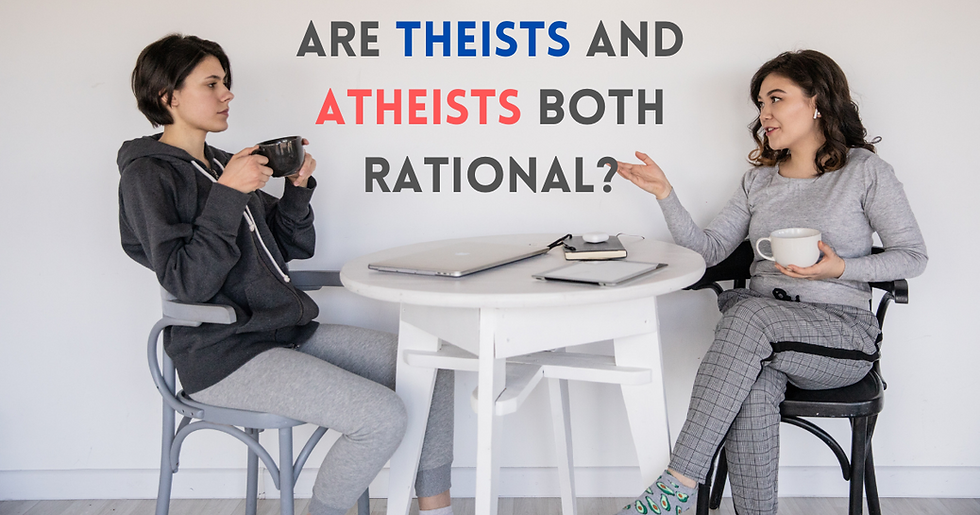Should You Be an Atheist? Maybe!
- Clint

- Jan 20, 2021
- 4 min read

Ra, Marduk, Baal, Zeus, Thor - you see these names on tombstones as you walk the graveyard of history’s dead gods. Their burials made final with the passing of their last believers.
Of course, their supposed metaphysical existence doesn’t depend on the thoughts of human beings, but scarcely anyone takes the idea seriously that Zeus is a real, personal entity “out there”.
Do you? I don’t. I don’t find myself having any reason to think Thor is a real, hammer-wielding deity ready to get involved with the goings-on of my life.
Enter my atheist or agnostic friend: “Yeah, me too. And I also would say the same thing about Yahweh, Jesus, Holy Spirit, Allah, Brahman, or any other figure that managed to not have their name forgotten in the graveyard alongside their fallen compatriots. I just take my atheism one god further than your atheism.”
It is at least an interesting question: Why do I feel so differently about this collection than I do about the Baal, Zeus, and Thor group? I view Jesus, Allah, and Brahman as far more live options than the others.
Perhaps it is purely my own “chronological snobbery” and I unduly view beliefs of the past as intellectually inferior, but there’s a bit more to it. Comparing the modern version of the monotheistic God to a character like Zeus is a bit unfair. Poor Zeus has been plucked out of a pantheon of other gods and doesn’t possess anything close to the magnificent properties “God” has been given: omnipotence, omniscience, creator, sustainer, omnibenevolence, eternal, everlasting, etc… Part of it may just be that I have very little interest in wondering about Zeus’ existence because he pales in comparison to the monotheistic God.
No doubt I’d likely be a true believer in Zeus were I born at the height of his popularity, and likewise, it is not an enormous surprise that I believe in God, and more specifically Jesus, given the time and land in which I was born.
To be sure, I also think I have good reasons to think that God exists. These reasons may not be “publicly available” in the sense that if I were to write them out, then they would be persuasive to the skeptic. It could be that the evidence I have of God’s existence is private; located in a set of experiences I have had of God in my conscience/mind/soul. The skeptic would probably like to give an alternate explanation of those mental events that I experienced - and that’s fine - they should! That is, they should given the tenets of their non-god worldview.
I could imagine someone reflecting on their experience and believing that they have not had encounters of some kind with God in their conscience and thus do not subscribe to the idea that God exists. And even further, they really may not have actually had such an experience. It could be that God doesn’t give everyone the same kind or degree of “religious experience”. That’s at least logically possible. Now, it may open up a new “problem of evil” such that God is unjust in his self-disclosure to some and not others. But the response from the previous blog would apply to that as well - human beings simply aren’t in the epistemic position to access and assess the reasons God has for doing/allowing the things that God does.
If we allow space for such “private evidence” or religious experience into our epistemology, then we get a peculiar, yet interesting result. Given the available evidence you have, you might be rationally justified in your theism or rationally justified in your agnosticism/atheism. That is, since individuals may have varying levels of available evidence of God’s existence, such individuals may come to different conclusions and both would be rational in doing so. To be clear, one of the two individuals is incorrect in their belief, it cannot be the case that both God exists and God does not exist, but both might be justified in having reached their conclusion.
I’ve found that this way of thinking about the topic is really helpful in having conversations with people that believe differently than I do. It is no longer a battle to discover who is rational or irrational in their belief. Rather, I can seek to understand the other person’s perspective, what evidence is available to them, and get to know the person better rather than trying to marshal evidence in such a way to cudgel them into belief-submission. Such polemics and tactics are rarely effective and they may not be the way the hidden God would want people to come to know that God exists.
For more on what it means to be an atheist or agnostic, check out this week’s podcast called Should You Be an Atheist? Maybe!
If you dig what Tony and I are doing, the best way to support us is to tell a friend about the podcast or blog.
If you have any questions or comments, please let us know at mailbag@opentotruth.com.
Thanks for Joining the Conversation and Stay Curious!



Lovely blog youu have here